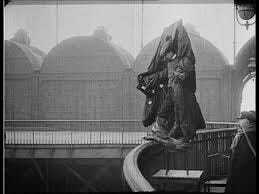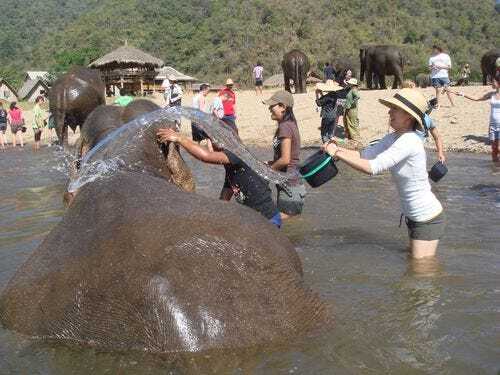The Elephant Didn't Ask to be Washed
Franz Reichelt
While casting around for a suitable metaphor with which to represent the business of Australian letters, I stumbled upon the rise and (very sudden) fall of Franz Reichelt. Reichelt was a 33 year old Parisian tailor with a very big moustache who dabbled in parachute making. One day in 1922, he arrived at the Eiffel Tower to test his new all-in-one wearable parachute. Grainy newsreel shows him proudly modelling his handsomely-tailored suit before ascending the tower, climbing onto a handrail, looking over with a seemed-like-a-good-idea-at-the-time expression, spending forty seconds trying to convince himself to jump, moving hesitantly forward, moving back, forward, back, before leaping. And that’s what I’m interested in. That fraction of a second before he finally jumped. Only humans (especially writers, but I’m getting to that) have the capacity for that sort of self-delusion. After the failed test, industrious Parisians are seen measuring the depth of Reichelt’s impact crater, then removing his corpse.

9.8m/s/s
I’d like to understand what motivates a person to write. To give up thousands of hours of valuable time to scribble a story about a man who leaves his wife; life in a small town after the discovery of a body of a person related to an alcoholic detective caring for his cantankerous father; the fun-times had by a pair of school friends on an adventure (&c.). The reality is
a) one in many hundreds of novels might get published, and one in a hundreds, thousands of these might find an audience;
b) very little to no money will be made from the venture;
c) the writer won’t end up joining the pantheon of authors they’ve admired since childhood;
d) the process will take time away from partners, children, friends, as well as the carrying out of otherwise sensible (paid) work;
e) the process of writing will keep raising a bar which, by attempting to reach it, will only cause it to rise even further;
f) (&c.)
And yet, every day, hundreds of new plays, novels and stories are begun, each author believing something new, untried, groundbreaking will make it onto the page and change lives. According to Steven Piersanti (Berrett-Koehler Publishers 2021), too many books are now being published (3 million+ per annum in the US alone), the book marketplace is oversaturated (meanwhile, people get most of their information from social media), sales are low (on average, a few hundred copies, and declining), books by non-A-listers won’t get shelf space in the few remaining bookshops, and most books now only sell to authors’ and publishers’ communities. The days when a Lucky Country could be found on most Aussies’ bookshelves are over (perhaps because the consensus found in such books is now missing). Recently, I was asked by a state writers’ centre to give a talk about writing, books, the ‘journey’ (@9.8 m/s/s), but declined, saying the only thing I could honestly tell prospective writers is don’t bother (which probably isn’t the message they want their paying members to hear). But after nearly thirty years of scribbling, a dozen published novels, half a dozen unpublished novels, short stories (&c.), it seems what started off as good, noble and necessary ends with a Lasseter’s Reef-sized feeling of dread. More, the suspicion that writing is a form of addiction as bad as alcohol, smoking and gambling and, like these, grows from a writer’s
a) lack of self-esteem;
b) reluctance to accept the world as it is;
c) dislike of other people;
d) inherited and/or acquired depression.
Point d) comes with a range of types and outcomes such as
a) boozy, self-destructive writers (Malcolm Lowry, John Berryman, Dylan Thomas);
b) the ‘haunted’ (Virgina Woolf, Ernest Hemingway, Sylvia Plath);
c) those who can’t see any way out (Stefan Zweig, Walter Benjamin); and
d) the overthinkers (Mark Fisher, David Foster Wallace)
And what’s worse, for every well-known suicide there’s probably another hundred lesser or unknown (especially writers who, like Reichelt, bet on success, and lost). Jonathan Franzen wrote in his famous ‘Harper’s essay’ (Why Bother?) that
the available evidence suggests that you have become a person who’s impossible to live with and no fun to talk to. And as you increasingly feel, as a novelist, that you are one of the last remaining repositories of depressive realism …you ask yourself, why am I bothering to write these books?
Moreover, the nagging question: did I start writing because I was depressed, or did I become depressed because I kept writing? In a way, a pointless question. The effect’s the same.
Hillcrest
I suspect writers are born, not made. This is my problem with writing courses, degrees, workshops (&c.). The equivalent of giving a classroom full of Year 9s their first vodka (or line). If a writer really wants to write, they will. I started off reading Asterix, Hardy Boys, sitting on my Hillcrest back lawn on long, summer nights tackling my first Agatha Christie. It always seemed important to find out who’d killed the maid. I was always around books. Over time they became a manual on how to survive an otherwise dull, suburban life. This led to Crime and Punishment, The Vivisector, the feeling the ever-present shitiness of the world could be explained (and maybe ameliorated) through stories. I was, writers are, hard-wired to see the world this way. So it makes sense that at some point they think, I could do that.
Because they can – anyone can. Having started on this path, having written novel #1 (and having it rejected), a new level of delusion sets in when we say, Of course, that’s what I did wrong: a lack of focus, wavering POV, predictable plot (&c.). We try again, but novel #2 has a different set of issues. Somewhere around novel #4 we produce something publishable, and it gets read by family, friends, a few kind strangers, and this gives us enough encouragement to keep going. At some point (with literary greatness still eluding us) we decide we’ve invested too much time and effort in this gig to give up. You can’t, after all, return a half-eaten Big Mac and say you never really wanted it. Better to keep eating. Maybe that’s what Reichelt thought, standing on the handrail, looking down at his supporters, all of them pretending to believe in him as much as he believed in himself.
God bless Peter Ross
You thought that was grim? In the past few decades, the Australian publishing industry has become a washed-out junkie searching for a cheap literary hit, publishing derivative books about happy dragons, alcoholic detectives, Thelma and Louise-style girlfriends moving to Provence to start a cake shop. The big, ambitious stories have gone, replaced with trembling yarns about our endless insecurities, managing, at the same time, to alienate any reader over thirty. More books by fewer authors with (ironically) less diverse stories; less (or no) risk-taking in content and form; a drift towards biographies of croquembouche-making or ball-kicking Aussie icons. Meanwhile, publishers costs go up, cover prices, bricks-and-mortar struggles, we have a less literate (and educated or critical thinking) nation of blokes and chicks who’d prefer to hit the local Westfield, the still ever-present diet of everything American (propped up by a lazy mainstream media), fewer university courses in the fine arts, art, anything involving text, fewer universities who give a rat’s about the things that made them great in the first place. Peter Ross used to have a crack at the Yarts on the ABC every Sunday afternoon. There was a feeling that watching Mother Courage or listening to the Rach 3 was somehow improving. But that seems to have gone, too. Ironic, as we need improving more than ever.
As a teacher, I’ve witnessed thirty years of dropping standards in our classrooms as underfunded and -supported teachers recycle 28 torn, coverless copies of Holes for yet another wrist-slashingly grim term. The feeling that Holes is necessary; that reading and writing, like long division, have to be endured. That nothing good can come from this literary car-crash. That whatever’s in that book (especially if you’re a boy, especially if you never see a male teacher) has anything to do with the issues you deal with on a daily basis. As the YouTube gen (not surprisingly) stare blankly out of the window (or peer at the ever-glowing and growing marvel in their crotch). As Walliams et al. pass off fart jokes as the solution. Meanwhile, the PE department gets a new hall, a bus to take the kids to yet another Intercol. But what’s so different, I guess, than the pots of money thrown at sporting clubs to allow us to become the World’s-Best-Perspirers (not that we come anywhere close). Funding might help creative types, too, but our arts departments have an East German-style habit of disappearing into the night. Even then, most writers give up on state support after a healthy batch of rejected funding applications (despite the promises of endless cultural policies).
A Unshakeable Nostalgia for Strawberry Pops
So a writer has a few books published, makes a slight reputation, attends a few book festivals, and what happens next? There’s no career progression. No progression. No career. The only thing Australians like better than ignoring culture is forgetting it. The neo-Oprahists remind us to ‘Never give up!’ But that was a sentiment borne of hard work and reward. No more. Now, even if you are the next-big-thing, you’ll still have a use-by date (Eighties’ bands playing the Victor Harbor RSL). Books are products, and you can’t keep selling Strawberry Pops when people want Tasty Bites. So you hit the mid-list. Here you have time to reflect on where it all went wrong. How people said such nice things at the beginning but now, don’t say much at all. In fact, can’t. For one, the Australian media has lost interest in books (reviews, book clubs, giveaways, summer reading promotions &c.). Our political class, too. I can’t remember the last time I heard an Australian politician extolling the virtue of an Australian novel.
Franz (again)
People always have told and will tell stories. Perhaps the issue’s more about the forms we choose, but the 100K+ word novel seems to have gone the way of the Mitsubishi A380. Then the 90K, 80K (&c.). In the end, all we’re left with is the fag ends of a cultural phenomenon that peaked in the nineteenth century, prospered in the twentieth, and now lingers in the S-bend of our national consciousness, and memory.
Writing’s like the guy who washes elephants. We only need one guy, but there’s a line of thousands wanting a go and when they do they decide they really like washing elephants and that’s all they want to do. So they tell their friends, then their friends want to wash elephants, too. And then the guy who runs the circus says, Please, stop wanting to wash elephants – I can’t even afford to feed this one. So now all of these people have set their sights on washing elephants, but instead of saying forget the elephants, we say, Here, come and study elephant washing in more detail and you’ll have a better chance of getting a (the) job. We put an enormous amount of effort into learning the art of elephant washing (study tours, residencies &c.) but the job never comes up because the elephant dies and we’re all sad and some wannabe elephant washers even kill themselves. Why? Because humans are sick, self-deluded puppies. Even after the elephant’s corpse sits rotting in the sun for a few years, we keep washing it. And then, the failed washers sit around looking at beautifully illustrated books of elephants and tweeting wistful elephant quotes and saying, What if? But really, if you act like a grown up and decide to do something apart from washing elephants, your life will probably be okay.
But even stranger than all this is the fact that even the people who did get a job washing elephants end up depressed. Maybe it’s because all writers are like this. Maybe we think that washing elephants will save us from ourselves? Take for instance the American poet John Berryman (of The Dream Songs), climbing onto Minneapolis’s Washington Avenue Bridge in 1972, looking back, thinking (possibly), What was that all about, and jumping (@9.8m/s/s). Early in his career (as a passionate poet and teacher) he’d explained the nature of the elephantine beast: ‘To write is hard and takes the whole mind and wants one’s whole time …’ But just before his suicide he’d decided: ‘Hosts of regrets come and find me empty. I don’t feel this will change, I don’t want anything or person, familiar or strange. I don’t think I will sing anymore just now; or ever. I must start to sit with a blind brow above an empty heart.’

All of which is why I come here today to tell you to forget the writing game. Anyway, it’s not like there aren’t enough books already. I mean, you might write something better than Anna Karenina, and I’m sure you’ll eventually write something beautiful, I’m sure the world will be a better place for what you’ve written, but will all of this make up for the time you’ve lost? Writers are optimists, trying to fill the void with meaning (or at least asking how this might be done). Hope being the last thing to die, all of that stuff about short rations, and we decide we can’t go on, but we go on because what’s the alternative if you’ve got a big brain? Or, as Flannery O’Connor explained:
People without hope not only don’t write novels, but what is more to the point, they don’t read them. They don’t take long looks at anything …
Either way, if we want to be optimistic, we should remember the world’s going to blow up in 4.7 billion years, and everything will be wasted. Also, 99.9% of all species that have ever lived are now extinct. How are we to know what any of those billions of organisms thought about the weather, sibling rivalry, why the sun kept burning, the price of bread, or even the eternity they now, exclusively, inhabit? Imagine if they’d written it all down! What’s it matter now anyway? The elephant didn’t ask to be washed. He, she or they liked being dirty. As it turns out, we were (and are) the bigger idiots. Despite their peanut brains, and our IBM computer-brains, true happiness can only be found rolling in sand. All of which is a long way of saying, if Reichelt had’ve been honest with himself, he would’ve admitted there was a good chance the parachute wouldn’t open.
Stephen Orr's Blog
- Stephen Orr's profile
- 31 followers



